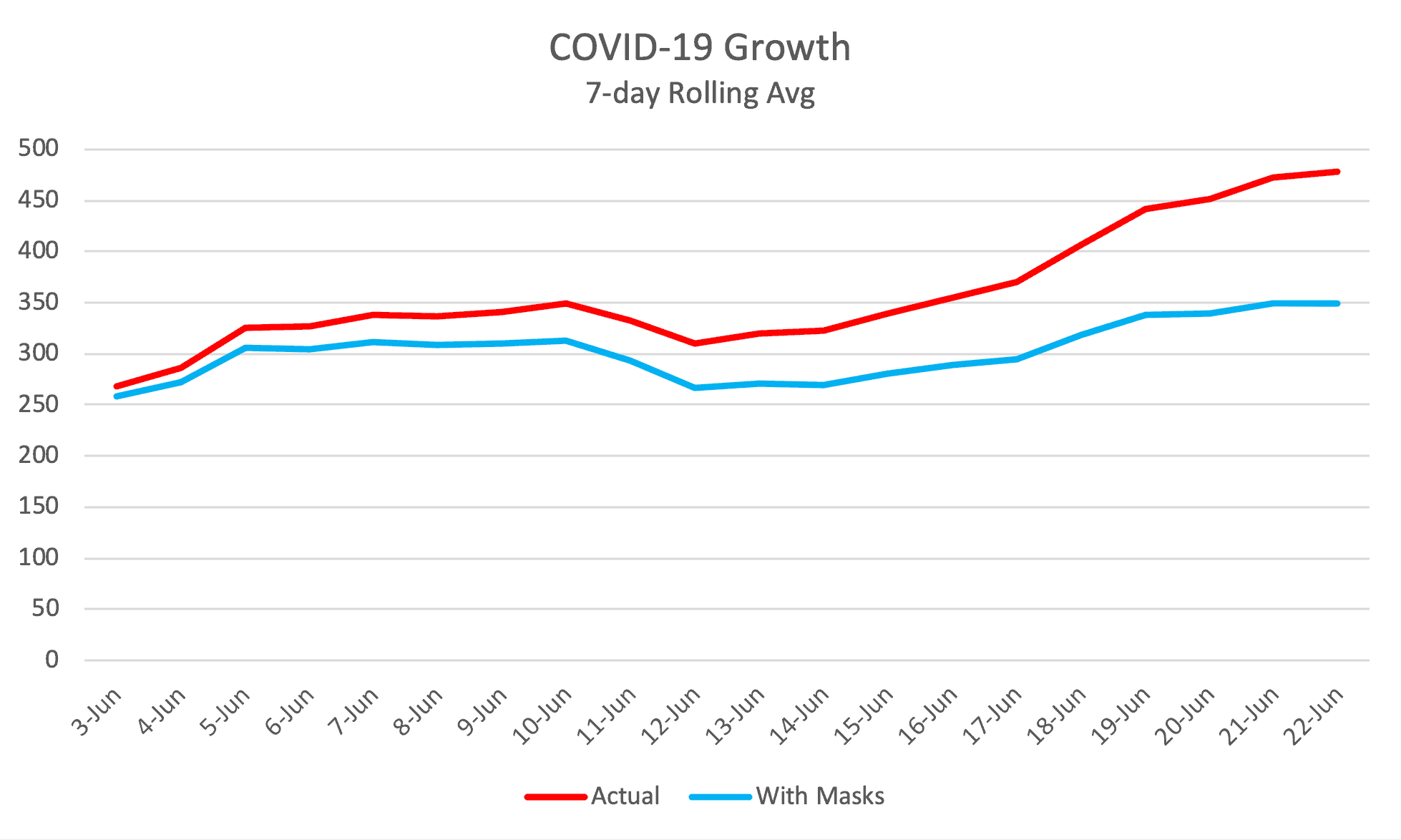
Written by Derek Monson
June 24, 2020
Governor Herbert signed an executive order Wednesday requiring masks in state-controlled buildings, including liquor stores and university buildings. He is also considering requests from local elected officials to allow them to require masks in public.
Unfortunately, this public health issue has also become tainted by national politics. Sound policy decisions must be based on constitutional principles and a wealth of evidence. Politics regularly undermines both.
Utah leaders considering a mask requirement can rise above the political fray by starting with two important questions:
- What do constitutional principles say about mandating masks in public?
- Are masks truly an effective public health measure for COVID-19?
Constitutional principles
The U.S. Constitution is largely silent regarding emergency powers in a pandemic, although Congress and the courts have granted the federal government certain powers in such situations. However, the primary responsibility for public health measures in emergencies lies with the states, so we should look to the Utah Constitution for principles to guide consideration of a requirement that people wear masks in public.
The Utah Constitution says that “no person shall be deprived of life, liberty or property, without due process of law.” When policies are decided as part of a public health emergency, the state law that guides due process is the Disaster Response and Recovery Act. The stated purpose of this law is to help government officials provide adequate response and recovery from an emergency disaster “in order to protect the lives and property of the people.”
This law gives legal authority to the governor to enact policies to respond to disasters, and also places checks on the governor’s emergency powers by requiring notice to or approval from Utah legislators. Under the processes established by these laws, and subject to their limitations, requiring masks in public does seem to fall under the Utah Constitution’s due process of law principle.
Of course, the public may or may not agree with such a policy decision. If the latter proved to be true, it would become apparent through communication of this disapproval to the governor and legislators (potentially leading to a change) and perhaps later through voters’ decisions on Election Day.
Effective policy
Will mandating masks in public curb the spread of COVID-19? Some states have already enacted such policies, producing data that can offer insight.
A recently published, peer-reviewed study examined rates of growth of COVID-19 in 15 states that required the public to wear masks. The study found:
- A mask-wearing mandate was correlated with a significant day-to-day decline in COVID-19 growth.
- The decline increased in size the longer the mask-wearing mandate was in effect.
Applying the findings of this study to the spread of COVID-19 in Utah, based on available state data, can illustrate what this evidence means for any potential mask policy in Utah. The current surge in new COVID cases began to appear in positive COVID test results beginning on May 28. Let’s say that the state had mandated masks in public on May 27, and the subsequent trend in daily COVID-19 growth followed the pattern in the 15 states in the study. In that case, Utah’s seven-day rolling average of new COVID cases would have been nearly 27% lower on June 22 than it actually was (350 cases vs. 478 cases).
To better see the potential difference in outcomes, below is what the study suggests that Utah’s seven-day rolling average might have looked like between June 3 – seven days after the hypothetical mask policy’s enactment – and June 22. The rolling average with masks (blue line) is shown relative to Utah’s actual rolling average growth in cases (red line).

Of course, this study is reporting the equivalent of an “average” of what happened in the 15 states it looked at. Utah’s particular results would have been different than the average due to its unique circumstances. Additionally, this is just one study, whose results need to be verified by further research to have high confidence that they are capturing a direct connection between wearing masks and statewide COVID-19 growth trends.
But that said, evidence from this study does suggest the possibility that a mask requirement could be an effective public health measure to reduce the spread of COVID-19.
Mask mandate: Good or bad idea?
The evidence considered here does not definitively say that a mask-wearing requirement is a good policy or a bad policy. But it does prove that there are important principles and valid evidence – things beyond politics – that can form the basis of a sound policy decision.
Constitutional principles and evidence-based research are important, but so too are the public health limitations formed by the consent of the governed. Is there public will for a mask requirement in Utah, and if so, how should that policy be structured?
Utah leaders should focus on finding a policy response to the COVID-19 surge that is calibrated toward widescale public compliance. If they do, they will have a better chance to effectively gain control over the pandemic before the fall.
More Insights
Read More
What you need to know about the upcoming state party conventions
The two major political parties are about to hold their state conventions. Here’s what you need to know.
Here’s why the First Amendment’s religion clauses are not in conflict
Some suggest there is a tension between protection for the free exercise of religion and the prohibition on the establishment of religion. But a better take is to see the two clauses as congruent.
Is California’s minimum wage hike a mistake?
Is raising the minimum wage a good tool to help low-income workers achieve upward mobility? That’s the key question at the heart of the debate over California’s new $20 an hour minimum wage law for fast food workers.


